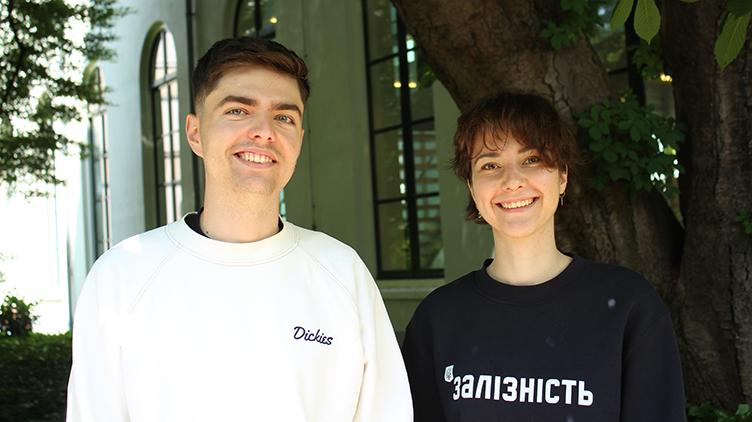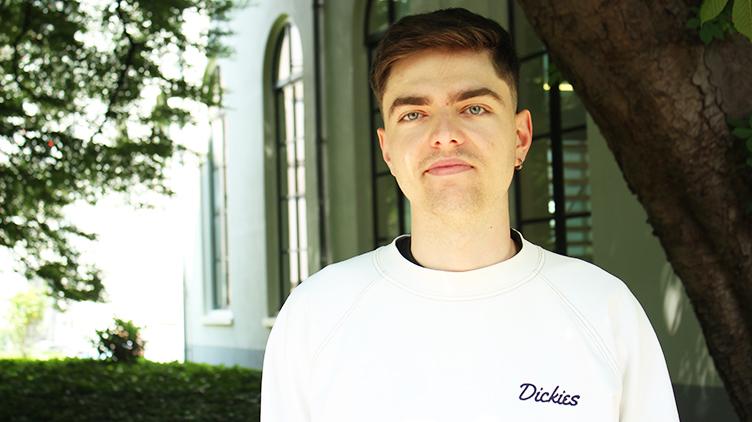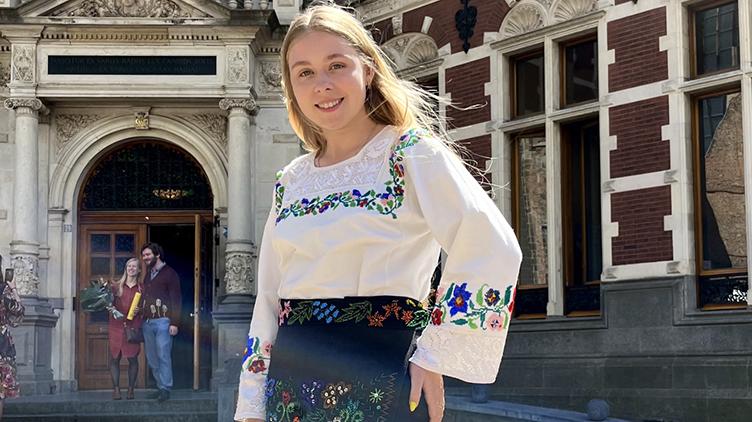Ukrainian students, one year later:
‘I’ve been trying to balance between thinking realistically and being hopeful’

Last year, when Russia invaded Ukraine, DUB talked to the three students about their thoughts and feelings regarding the war that had just started. Now, over one year later, we meet them again to ask how they are doing and whether those thoughts and feelings have changed.

Lisa Bashcheva
Study: Master’s in Gender Studies
Status: Prolonged her stay and is currently writing her thesis
Lisa was able to visit her family in Kyiv back in February. “It was so nice to spend at least one week with them.” However, she also heard air alarms going off. “One time I was walking alone when I heard the alarm. I was too far from a metro station, which could serve as a bomb shelter. I didn’t even know what to do or where to go. My next thought was pretty insane: ‘I’ve seen my family already. If I die now, it’s okay.’ Then I just continued walking as I was.”
One year ago, her little sister was staying with her in the Netherlands temporarily. She then went to boarding school in Austria and is now going back to her original school in Ukraine. “I truly love my sister and I hope she knows I’ll always be there for her. Of course, I’m worried and I don’t want her to experience war at all, but I understand how hard it must have been for her to be away from our family for so long. Perhaps that’s too much to ask from a 13-year-old. Stressful situations such as war change your priorities. You understand more what matters to you, where you want to be and with whom. So, if she’ll be happy being reunited with our parents, that’s the most important part.”
Lisa prolonged her studies at UU for another year so she could have more time to work on her thesis. Unfortunately, this process was anything but smooth. “I contacted the student services and the student advisor and they both told me I would only have to pay for the time I still needed. But afterwards, I was informed that I’d have to pay the full tuition fee for non-Europeans for the whole year, which is about 17,000 euros. In the end, the issue was due to a mistake in their system but it caused me lots of stress because I received two or three payment requests and nobody was answering my emails.” By the end of the month, when the deadline to pay was just around the corner, it was finally confirmed that Lisa would not have to pay the entire sum because she was from Ukraine.
Just when she thought the worst was behind her, she grappled with renovating her student visa. One of the requirements for doing so is presenting a bank statement to prove that either the student or their sponsor has at least 12,000 euros. Kyiv’s infrastructure was under a massive attack at the time and getting a bank statement was extremely difficult. Lisa then contacted the National Immigration Services (IND), which informed her that the university could act as her official sponsor. However, the dean told Lisa that the university’s fund to help Ukrainian, Russian and Belarussian students could not be used in this manner. “I didn’t need money, though. I just needed a piece of paper. I couldn’t understand why the university helped me to cover the tuition fee – which is super nice, obviously – but they couldn’t be my financial sponsor on paper.” She ended up solving the situation with the help of friends.
Now that everything is sorted, Lisa is focusing on her thesis and she plans to stay in the Netherlands after her graduation. She doesn’t see herself moving back to Ukraine anytime soon. “When I went back to Kyiv, I actually realised that I only have my family and three or four friends in Ukraine with whom I actively keep in touch. I feel like I have a bigger circle of friends here. So, the Netherlands also feels like home to me, which I’m really grateful for.”
She says she is trying to stay realistic about the war but the idea that it could last for several years is unfathomable. “The other day I was talking to a Syrian friend and, although we can’t really compare the two wars, he said he thinks things will last just as long in Ukraine. It’s weird even to consider that possibility. So, I’m trying to protect myself by blocking those thoughts and not overthinking.”

Photo: Alice Dribnokhod
Andriy Ostryagin
Study: Second year of the Bachelor’s in Philosophy, Politics & Economics
Status: his newfound sense of Ukrainian community is going strong
Andriy has been living with his mom in the Netherlands for a decade. He is from Dnipro, where most of his family still lives. The city is not at the epicentre of the war, so everyone he knows is safe. Some of his mom’s friends came to the Netherlands but they decided to move back to Ukraine after a while. “It is not necessarily safer now but the situation seems more predictable to them. Besides, it’s hard to have your family separated. Men are not allowed to leave the country.”
When the war started, Andriy joined several protests and made many Ukrainian friends as a result. “I ended up finding a Ukrainian community I didn’t even know existed. I’ve never felt more Ukrainian than now,” he told DUB a year ago. He still keeps up with a lot of the people he met last year. “I went with them to this big protest in Amsterdam on the first anniversary of the invasion.”
He also joins voluntary projects to help Ukraine and Ukrainians whenever possible. “One of my friends from The Hague drives to Ukraine every month or so to bring equipment such as drones to support the people there. I help out with crowdfunding and sometimes translate things online as well.”
This past year, Andriy has developed a new habit: always saying how long he’s been living in the Netherlands after telling someone he’s from Ukraine. “People tend to assume I am a refugee unless I clarify. I don’t get offended by it and I understand why they do it. Still, I don’t want to be mislabelled because Ukrainian men over 18 are banned from leaving the country due to martial law. I don’t want to be viewed as a deserter."
The way people react when he says he’s Ukrainian has changed as well. “At the beginning of the war, people were more direct. Like ‘Oh my God, that’s horrible, how are you doing?’ It was nice that people were genuinely worried. But now a lot of people say: ‘Ukraine? Nice!’ and I don’t know how to feel about that. It’s just a weird situation. I don’t think there is a right or wrong way to react, though.”
At the start of the war, Andriy and his mother, whose first language is Russian, decided to start learning Ukrainian. One year later, they are so confident in their skills that they only chat with each other in Ukrainian on WhatsApp.
Being a PPE student, he likes to reflect on the political, economic and ethical aspects of the war but his media consumption has greatly diminished. He used to follow a lot of Telegram channels, but that was “overwhelming”. He’s since switched to more general news outlets, which he checks out about once a day.
He doesn’t expect the war to end anytime soon. “For Western governments, it’s about how much money or how much military equipment this is going to take. But for Ukrainians, it’s about how many soldiers are going to die. The longer it lasts, the bigger the human cost.” He has also gotten less and less optimistic about the idea of an international world order. “Now, I realise that most international organisations can’t do much against Russia because Russia is a big part of the organisations themselves. The Security Council, for example. Putin will only be held accountable when he loses his power and influence. It’s kind of sad that things can only be done retroactively.”
At the same time, Andriy says he is optimistic about how things will go because the political support for Ukraine doesn’t seem to be waning.

Anna-Mariia on her graduation day. Photo: courtesy of the graduate.
Anna-Mariia Sukhar
Study: Graduated with a Master’s in Sociology and Social Research
Status: Working part-time research jobs on Ukrainian refugees
Despite the challenging year, Anna-Mariia obtained her Master’s degree and her family came to Utrecht for the graduation ceremony, with the exception of her father. She decided to stay in the Netherlands to look for a job. She’s found two part-time positions: one at Regioplan, in Amsterdam, where she’s joined a project about the integration of Ukrainian refugees into the Dutch labour market, and another one at Opora, in a project about the mental health of displaced Ukrainians in the Netherlands.
“I’m quite happy because, in addition to the professional side, I am also doing something for the Ukrainian people. I have a chance to contribute to research that will be further used to influence the development and improvement of policies applied to Ukrainians under temporary protection.”
To write her thesis, cutting down her news and social media consumption was paramount. “During the first few months of the war, I was checking five to six different sources, not including YouTube and other social media. I would get a notification on my phone every five minutes, basically. At some point, I realised I had to be less up-to-date because my life is here and I had to study. Today, I still check a couple of sources, sometimes just once a day and at other times, three or four times a day.”
She too has noticed a shift in people’s reactions when they learn that she is from Ukraine. “In the beginning, people were more interested in asking questions. Sometimes these questions were kind of private, though. They asked me things I wasn’t sure if I wanted to share or if I was ready to talk about it. But I made an effort to do so anyway because I understood that it was important. I could educate people this way, and make them aware of what was going on. Today, people still ask me where my family is, which city I’m from, and things like that. But sometimes that’s more out of curiosity, it’s not exactly to support me.”
Anna-Mariia has grown somewhat jaded since the beginning of the war. One year ago, she declared to DUB that it was a shame that students in Utrecht were not organising protests against the invasion of her country but now she doesn’t expect much from people anymore. “My attitude overall has changed. Things were turned upside down: one day you are living in a world of democratic values, a world of justice, being protected in some way. Then, suddenly, you understand that there is no justice. There are people making money from this war. Some people don’t want it to end anytime soon. Or they just don’t care. When you realise this, you start expecting less and less from people and the world in general.”
She would definitely like to move back to Ukraine someday. “I can't imagine living my whole life in the Netherlands. I do wish to return to Ukraine at some point. The question is when. But if you're talking about the near future, probably not.” She is “kind of blocking” thoughts about the possibility of the war lasting for a long time. “Yesterday, I read in the news that Denmark and the Netherlands are going to give Ukraine fourteen tanks… At the beginning of next year. I’m not ready to still be living through this war by then. I was hoping that, by that time, Ukraine would have already received a lot of different weapons and soldiers would have been trained. I guess I was expecting that all these resources would be accumulated in the course of a few months. Basically, I’ve been trying to balance between thinking realistically and being hopeful.”